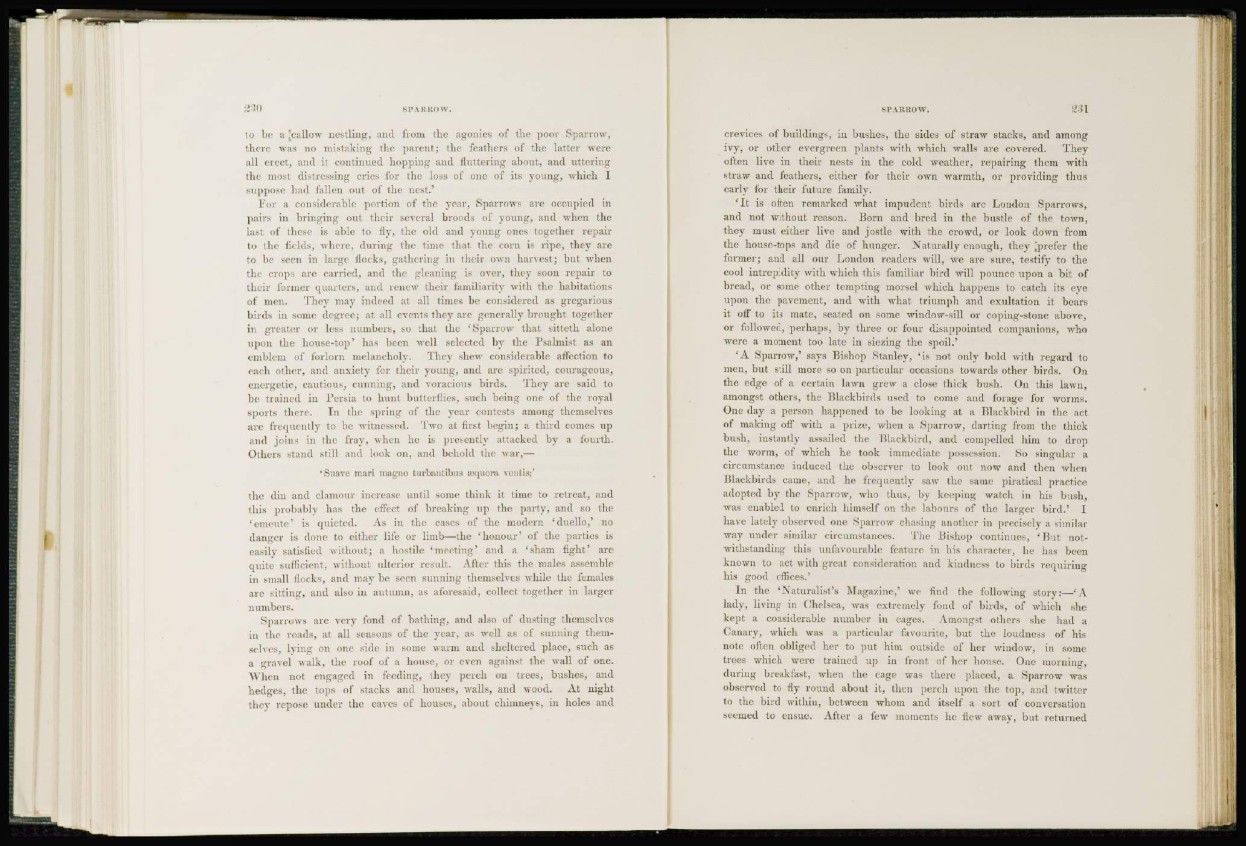
to be • [callow nestling, and fvom the agonies of the pom* Sparrow,
there was no mistaking the parent; t lie feathers of the latter were
all erect, and it continued hopping and fluttering about, and uttering
the most distressing cries for the loss of one of its young, which I
suppose had fallen out of the nest.'
For a considerable portion of the year, Sparrows are occupied in
pairs in bringing out their several broods of young, and when the
last of these is able to fly, the old and young ones together repair
to the fields, where, during the time that the corn is ripe, they are
to be seen in large flocks, gathering in their own harvest; but when
the crops are carried, and the gleaning is over, they soon repair to
their former quarters, and renew their familiarity with the habitations
of men. They may indeed at all times be considered as gregarious
birds in some degree; at all events they arc generally brought, together
in greater or less numbers, so that the ' Sparrow that sitteth alone
upon the house-top' has been well selected bv the Psalmist as an
emblem of forlorn melancholy. They shew considerable affection to
each other, and anxiety for their young, and arc spirited, courageous,
energetic, cautious, cunning, and voracious birds. They are said to
be trained in Persia to hunt butterflies, such being one of the royal
sports there. In the spring of the year contests among themselves
are frequently to be witnessed. Two at first begin; a. third comes up
and joins in the fray, when he is presently attacked bv a fourth.
Others stand still and look on, and behold the war,—
'Suave mari iniigno tarbiuitibus nquora ventis;'
the din and clamour increase until some think it time to retreat, and
this probably has the effect of breaking up the party, and so the
' emeute' is quieted. As in the cases of the modern ' duello,' no
danger is done to either life or limb—the 'honour' of the parties is
easily satisfied without; a hostile ' meeting' and a ' sham fight' are
quite sufficient, without ulterior result. After this the males assemble
in small flocks, and may be seen sunning themselves while the females
arc sitting, and also in autumn, as aforesaid, collect together in larger
numbers.
Sparrows are very fond of bathing, and also of dusting themselves
in the roads, at all seasons of the year, as well as of sunning themselves,
lying on one side in some warm and sheltered place, such as
a gravel walk, the roof of a house, or even against the wall of one.
When not engaged in feeding, they perch on trees, bushes, and
hedges, the tops of stacks and houses, walls, and wood. At night
the) repose under the eaves of houses, about chimneys, in holes and
crevices of buildings, in bushes, the sides of straw stacks, and among
ivy, or other evergreen plants with which walls are covered. They
often live in their nests in the cold weather, repairing them with
straw and feathers, either for their own warmth, or providing thus
early for their future family.
' I t is often remarked what impudent birds arc London Sparrows,
and not without reason. Born and bred in the bustle of the town,
they must either live and jostle with the crowd, or look down from
the house-tops and die of hunger. Naturally enough, they Jprefer the
former; and all our London readers will, we are sure, testify to the
cool intrepidity with which this familiar bird will pounce upon a bit of
bread, or some other tempting morsel which happens to catch its eye
upon the pavement, and with what triumph and exultation it bears
it off to its mate, seated on some window-sill or coping-stone above,
or followed, perhaps, by three or four disappointed companions, who
were a moment too late in siczing the spoil.'
'A Sparrow,' says Bishop Stanley, 'is not only bold with regard to
men, but still more so on particular occasions towards other birds. On
the edge of a certain lawn grew a close thick bush. On this lawn,
amongst others, the Blackbirds used to come and forage for worms.
One day a person happened to be looking at a Blackbird in the act
of making off with a prize, when a Sparrow, darting from the thick
bush, instantly assailed the Blackbird, and compelled him to drop
the worm, of which he took immediate possession. So singular a
circumstance induced the observer to look out now and then when
Blackbirds came, and he frequently saw the same piratical practice
adopted by the Sparrow, who thus, by keeping watch in his bush,
was enabled to enrich himself on the labours of the larger bird.' I
have lately observed one Sparrow chasing another in precisely a similar
way under similar circumstances. The Bishop continues, ' But notwithstanding
this unfavourable feature in his character, he has been
known to act with great consideration and kindness to birds requiring
his good offices.'
In the 'Naturalist's Magazine,' we find the following story:—'A
lady, living in Chelsea, was extremely fond of birds, of which s he
kept a considerable number in cages. Amongst others she had a
Canary, which was a particular favourite, but the loudness of his
note often obliged her to put him outside of her window, in some
trees which were trained up in front of her house. One morning',
during breakfast, when the cage was there placed, a Sparrow was
observed to fly round about it, then perch upon the top, and twitter
to the bird within, between whom and itself a sort of conversation
seemed to ensue. After a few momenta he flew away, but returned